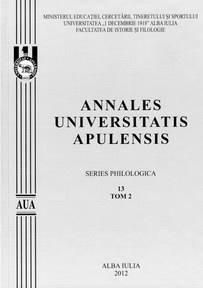„Molitfelnicul” românesc. Studiu asupra denumirii acestei cărţi liturgice în istoria culturii româneşti
The Romanian „Molitfelnic”. A Study Regarding the Name of this Liturgical Book in the History of Romanian Culture
Author(s): Ştefan Teofil GrosuSubject(s): Literary Texts
Published by: Universitatea »1 Decembrie 1918« Alba Iulia
Keywords: Molitevnic; Evhologhion; Trebnik
Summary/Abstract: The Euchologium is one of the most important liturgical books. This is the reason of its publishing in Romanian in so many copies along the years. The history of its translating and publishing in Romanian is connected to the struggle for ecclesial rite nationalization in the Romanian Regions, beginning with the publisher Coresi, continuing with the metropolitan Dosoftei, and finishing with the work of the metropolitan Antim Ivirian. The denomination Molitvenic has a Slavonic origin, bordering its content, and comes from the Slavonic term: molitva, meaning prayer; in extension we could say that Euchologium is by excellence the Book of Prayers. The Romanian editions presented the Slavonic name in different forms. We could thus choose among several variants: Molitvenic, Molitvnic, Mitvnik, Molitfănic ,Molitfelnic. The denomination imposed until today is Molitfelnic. The first Slavonic copies have had this name – as the Cetinjie edition (1495) – but in the history of Slavonic churches the terms Trebnik or Potrebnik, were considered by the majority of theological and cultural Slavonic people as the most complex denomination because the Euchologium does not only have simple prayers but the whole rite of the Eastern Church: the Seven Sacraments, and all the Ceremonies used by the priest in all circumstances. The one who made the passage from the old name to the Trebnik, was Petru Moghila, the metropolitan of Kiev, who, in 1642, prints the Book in three extended volumes. He will compose several prayers that cannot be founded in the Greek originals. This name can be found in some Romanian printings as the one from Chişinău, (1908). The latest will adopt the Russian name already consecrated there.
Journal: Annales Universitatis Apulensis. Series Philologica
- Issue Year: 13/2012
- Issue No: 3
- Page Range: 129-138
- Page Count: 10
- Language: Romanian

